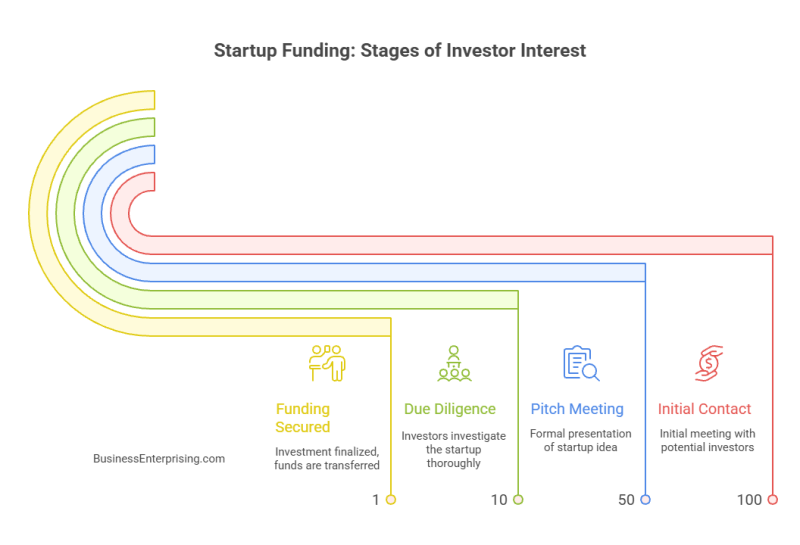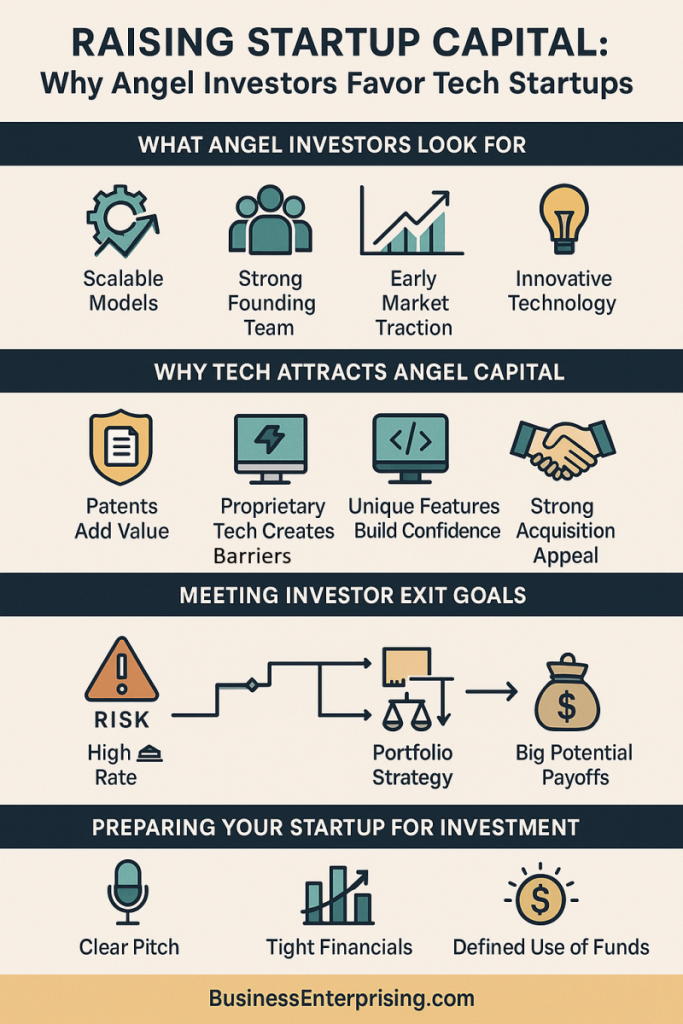
Angel investors tend to move early and take more risk. Therefore, many tech founders aim to secure funding from this group. If you prepare well, you increase your chances. Additionally, understanding what attracts these investors can help you refine your pitch.
Tech startups stand out for their speed, innovation, and growth potential. These traits match what most early investors look for. However, that also means the market is competitive. You need to show more than a product. You need to prove that your business can grow quickly and return value.
Additionally, you must present your numbers clearly. Investors want to see how you plan to generate revenue and manage costs. They also want to know what their investment will fund. Therefore, every part of your pitch should support a simple goal: building confidence.
Raising capital is not a guarantee of success, but it is a test of your readiness. If you can explain your model, defend your plan, and prove demand, you are already ahead. Focus on building trust and clarity. Those qualities go a long way in early fundraising.
What Angel Investors Look for in Early-Stage Startups
When you pitch to angel investors, they look for more than a good idea. They want a business that can grow fast. Therefore, a scalable model ranks high on their list. If your business can grow revenue without growing costs at the same rate, it gets attention. Investors want to see that your idea can reach more people without needing massive new resources.
Additionally, your founding team matters. Investors pay close attention to the people behind the product. They want to know that you and your team have the skills to execute. Strong leadership, complementary talents, and a clear commitment often carry more weight than a full product. Therefore, highlight your background, not just your business model.
Traction also signals potential. If you already have customers, users, or revenue, it shows that the market is responding. That’s a good sign for any investor. However, early traction does not always mean money. It can be as simple as user engagement or strong pilot results. Show that something is working.
Technology also plays a role. Angel investors often look for innovation. They want to back companies doing something different. Additionally, proprietary features or unique designs make your idea harder to copy. This can help protect future value.
Raising startup capital means showing why your business deserves early support. Therefore, focus on what makes your company investable. Your pitch should tell a story about potential, not perfection. Investors understand risk. They back teams and models that give that risk a reason.
Why the Tech Sector Attracts Angel Investment
Tech startups attract angel investors because they offer fast growth with fewer physical limitations. Software and digital platforms scale quickly. Therefore, revenue can grow rapidly without massive increases in cost. This appeals to investors looking for high returns.
Additionally, the tech sector creates new markets or changes old ones. That level of disruption draws attention. Investors want to fund companies that can shift how industries work. Therefore, bold ideas with wide application often get strong interest.
Low marginal costs make tech even more attractive. After the product is built, it costs very little to serve each new customer. That means higher margins as the business grows. However, this also means investors expect growth to be efficient and fast.
Acquisition potential is another factor. Large tech companies often buy startups to gain technology or talent. Therefore, angel investors see real chances to exit early and profit. Startups in health tech, fintech, or SaaS often draw this kind of attention.
Additionally, the market for tech investment continues to expand. Tools, data, and platforms make launching easier and faster. This shortens the timeline between funding and results. That appeals to early-stage investors who take on higher risk.
If you’re raising startup capital in tech, highlight these strengths. Show your model can scale. Show how your idea stands out. Investors want businesses that grow quickly, change their market, and attract buyers. Tech gives them that chance more often than most industries.
The Role of Innovation and Intellectual Property
Innovation gives tech startups a major edge when attracting early investors. Proprietary technology often sets your business apart from competitors. Therefore, investors see more potential when your product solves a problem in a new or better way. A unique solution signals market opportunity.
Additionally, patents and intellectual property provide legal protection. This protection matters because it reduces the risk of copycats. When your tech is hard to replicate, investors view it as a more valuable asset. Therefore, protected IP adds weight to your pitch.
Strong product features also increase confidence. When you build something useful, scalable, and original, you stand out. However, features alone are not enough. Investors want to see how those features translate into market value. Therefore, explain how your product improves something people already use or creates something entirely new.
Raising startup capital becomes easier when you show defensible innovation. Investors look for ideas that can hold their place in a growing market. Additionally, they want to know your product cannot be easily replaced.
Focus on what makes your offering difficult to copy. Patents help, but unique code, design, or data models can matter too. When your business owns something others can’t use, it builds long-term value. Therefore, make your innovation part of the story you tell. Show how it adds strength and attracts attention. That story often leads to funding.
How Tech Startups Meet Investor Exit Expectations
Angel investors always think about the exit. They want to know how and when they can turn a profit. Therefore, tech startups stand out because they offer more paths to exit compared to other industries. These paths include acquisitions, IPOs, and secondary sales.
Acquisitions are the most common. Larger companies often buy startups to gain new products, talent, or users. Additionally, acquisitions can happen early, sometimes before the startup turns a profit. That possibility makes tech appealing to investors who want quicker returns.
IPOs offer another option. Some tech companies grow fast and enter public markets to raise capital. This allows early investors to sell their shares. However, IPOs take time and require strong growth. Most angel investors focus on startups that might get acquired first.
Secondary sales also play a role. These deals let investors sell their shares to other buyers during later funding rounds. Therefore, investors don’t always need to wait for a full exit. This flexibility lowers the risk and increases interest in early-stage tech deals.
Raising startup capital often depends on how you present these options. If your startup shows potential for any of these outcomes, you gain investor confidence. Additionally, a clear exit path helps you stand out from other founders. Investors want to see that you understand their goals. Always build your business with an exit in mind. That way, your decisions will align with what investors value. Over time, that mindset will make your startup more attractive and better positioned for funding.
Risks Angel Investors Accept in Tech and Why
Tech startups fail more often than they succeed. Angel investors know this going in. However, they still put money into early-stage tech. Why? Because the upside can be massive. A single win can offset many losses.
Additionally, many tech startups operate on scalable models. Platforms, SaaS tools, and consumer apps grow quickly without growing costs. That means profit potential increases sharply with adoption. Therefore, investors see a path to large returns if the product gains traction.
Failure does not always mean zero return. Some companies get acquired for their teams or technology. Even small exits return some capital. However, investors focus on the chance that one company will outperform the rest. That’s why they often fund multiple startups across a portfolio.
Tech also moves faster than other industries. Products can launch quickly, scale fast, and reach global users. Additionally, early users often serve as a testing ground for growth. If a product takes off, the return on investment can happen sooner than expected.
Raising startup capital in tech means understanding investor psychology. You are not selling safety. You are offering a chance at high growth. Therefore, show how your business could produce a big win, even if others fail. Be realistic about risk but confident in the reward.
Investors accept the risk because of the reward. They bet on teams, timing, and market need. If you can show all three, you become a better bet. That’s how tech earns its place in early-stage investing.
Preparing Your Tech Startup to Attract Angel Capital
If you want angel investors to take your tech startup seriously, your pitch must be clear and focused. Investors see many deals. Therefore, you need to explain what makes your business worth their time and money. That starts with telling a simple, sharp story.
Your pitch should highlight the problem, your solution, and why now is the right time. Additionally, show what makes your product different. Whether it’s a feature, speed, or design, make your edge obvious. However, do not overpromise. Stick to facts and outcomes.
Financials matter. You do not need years of data, but you do need solid projections. Therefore, present your revenue model, costs, and early results with confidence. Use clear charts and show you understand where the money goes. Additionally, break down how the investor’s money will be used.
Positioning your startup means showing you’re ready to grow. Have a working product, not an idea on paper. A small user base or pilot can make a big difference. Therefore, use real data to back up your story.
Raising startup capital requires more than energy. It takes structure, focus, and preparation. Additionally, practice helps. Pitch to advisors before approaching investors. Feedback strengthens your message and your confidence.
Investors want to feel that you understand both risk and reward. Therefore, be direct, calm, and credible. If you show you’re serious and prepared, you increase your chances of getting that first check. The early stage is competitive, but good preparation can give you the edge.
Conclusion
Raising startup capital takes more than having a strong product. It takes planning, preparation, and a clear understanding of what investors want. Angel investors take risks, but they look for signals of potential. Therefore, you must show that your tech startup can grow, scale, and return value.
Additionally, your story matters. Investors want to understand why your team, timing, and model give you an edge. They expect you to explain how the business works, how the product delivers value, and how their investment helps you move forward.
Show that you understand risk and reward. Be realistic about your challenges, but also be clear about your opportunities. If your product solves a real problem and can scale, you already have an advantage. Therefore, use your pitch to highlight that path.
Angel investors don’t need you to be perfect. However, they do want to see that you are prepared and focused. Strong financials, early traction, and a smart plan can set you apart. Additionally, make sure your communication is simple and direct.
Raising startup capital is competitive, but it rewards clarity and execution. Take time to refine your approach. Practice your pitch, tighten your numbers, and present with confidence. If you do, you give investors a reason to believe in your business. That belief can lead to funding, support, and long-term growth.



